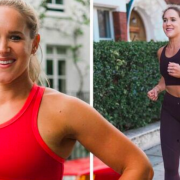Do you live in west London?
We used to live in Fulham, west London – but we left for Buckinghamshire in 1999, as my wife, Clare (also a doctor), and I thought we should go somewhere with decent grammar schools. Initially, I missed London, but now we love being out of town — and the friends we have made here.
What is your favourite thing about west London? Any favourite haunts?
I love the riverside in west London. We bought a riverside home in Fulham, at the height of the property boom, in 1987. We sold it seven years later for slightly less than we paid for it. We then bought a bigger house in Fulham and sold it five years later for a decent profit. If we had held on to it, it would now be worth squillions. Or would have been a year ago.
What has the effect of lockdown been on the nation’s health?
It has felt like life has been on pause during lockdown – including our motivation to eat healthily and keep our bodies moving. However, as restrictions slowly lift, so does our desire to get our health back on track. But it can be hard to know where to start.
We all know that eating plenty of fruit and veg and exercising is good for us. But at times, it can be really hard to summon up the enthusiasm, especially during this time of enforced lockdown. However, experts have been very conclusive that for people with pre-existing health conditions, Covid-19 seems to be more severe. This particularly appears to be the case for obese people.
What long term implications does that have for society?
While Coronavirus can affect any of us, for people with pre-existing health conditions, the impact of being infected seems to be more severe. This is particularly the case if you suffer from something called “metabolic syndrome”, a collection of medical conditions which includes a large waist (too much visceral fat), raised blood pressure, raised blood sugar levels and raised cholesterol score.
Simply being heavier can also put you at risk. That is because excess body weight is associated with poor sleep and breathing problems, which can lead to pneumonia if you get infected by the Coronavirus .
Sugar is one of the “bad guys” that crops up frequently when discussing health – can you tell us a little bit more about how it affects us physiologically?
Have you ever wondered why the more sweet treats we eat, it becomes harder and harder to resist a bite (or two, or three?) Appetite, it turns out, is much more a matter of how our bodies respond to insulin, than of how physically full our stomachs happen to be.
After a meal, the body keeps its blood-sugar levels within a safe range by releasing insulin. This, in turn, allows glucose to enter muscle cells for burning, and fat cells for storage. Insulin also triggers your neurons to send a “don’t eat” message to your appetite-centres. This works well enough when we leave a good space of time between meals, and eat low-sugar, high-fibre foods, as our ancestors did for millions of years.
In the sugar-saturated modern world, though, the system breaks down. Dosed with frequent glucose-spikes, our insulin receptors grow insensitive. Even though we have taken in more than enough energy, our sense of fullness is blunted: We feel a continuing urge to eat more.
Effective weight loss depends on putting a brake on the vicious cycle of insulin resistance. By cutting out high-sugar foods, changing our eating patterns and exercising, we give our cells a chance to recover, and to regain their insulin sensitivity, in the brain as well as in the muscles. Before long, it becomes easier to feel fuller for longer.
You’re a big proponent of Intermittent Fasting and have put together your own programme based on the method called The Fast 800. What does it involve?
Intermittent fasting is an effective, healthy way to lose weight quickly and keep it off, which is essential to keep you motivated. As you are mixing up the amounts and timings of foods you can have, this help stop meal monotony. There are several methods you can try.
If you want to lose weight fast and think you can stick to a lower amount of calories every day, then try eating 800 calories daily, for a couple of weeks, which is a brilliant weight loss booster. I recommend Med-style meals as this will give you quality nutrients for the calories you eat and are full of satisfying fibre: think traditional Med (not modern Italian pasta and pizza!) like fruit, veg, lean meats and fish, eggs, pulses, nut, seeds and olive oil.
If you have more weight to lose and feel happy on this plan, then you can continue on 800 calories daily for up to 12 weeks – you could lose up to 2 stone in the first 8 weeks! If you don’t feel comfortable, with 800 calories a day and are suffering from hunger pangs, switch to a 5:2 plan. This is also good if you like to dine out a lot and want to have days where you don’t count calories.
Can you tell us about some of the other health benefits other than weight loss?
The Mediterranean-style low carb approach which we recommend in The Fast 800, is a low sugar diet, low in starchy, easily digestible carbs, but packed full of disease-fighting vitamins and flavonoids. It is rich in olive oil, fish, nuts, fruit and vegetables, but also contains lots of lovely things that down the years we have been told not to eat, such as full-fat yoghurt and eggs.
The PREDIMED study followed up more than 5,000 patients who were healthy at the start of the study, but who had risk factors for cardiovascular disease. After 4.8 years, the group that followed a Mediterranean-Style Diet were 30% per cent less likely than the group following a low-fat diet to have experienced a stroke, a heart attack, or death due to another cardiovascular disease.
Where does exercise fit into all of this?
There was once a time when exercise meant a few sessions each week spent training or playing sport. Today, science has come a long way from that. Studies have shown that in order to lose weight, you need to combine three types of activity: high-intensity interval training (HIIT); low-intensity, or “incidental” activity; and resistance training.
Insulin resistance, which leads to raging hunger and all sorts of problems including raised blood sugar levels, often starts with inactivity. If you don’t use your muscles enough, then over time, fat builds up inside the muscle fibres and insulin resistance develops. The best way to reverse this is to get more active. Sit less, move more.
Walking is a great way to reduce insulin resistance and keep hunger at bay. The important thing is to make your walking brisk. One of the most effective ways to get the maximum benefits is to do something called Active 10. This involves aiming at doing 3×10 minutes of brisk walking a day.
What’s one thing that people can do today to boost their health and wellbeing?
Switch to a Mediterranean diet – not only for weight loss but also for your mental health. While prescribed medication and counselling can be helpful, research now shows that our diet can also play a key role in managing stress and sleeplessness.
The link lies in our gut; two to three kgs of microbes live in the digestive system, and amongst other things they produce neurotransmitters. These chemicals convey messages from the gut, through the nervous system to the brain – impacting our mood and anxiety levels. 80% of our serotonin (our happy hormone) is produced in the gut – so the healthier the gut the more emotionally resilient we are. And the better we are feeling the easier it is to sleep.













